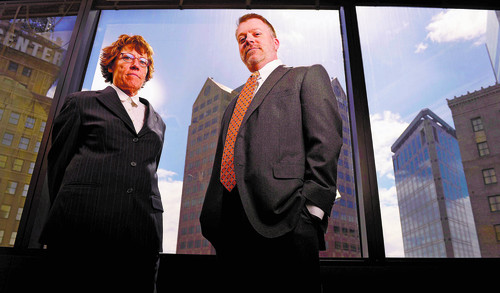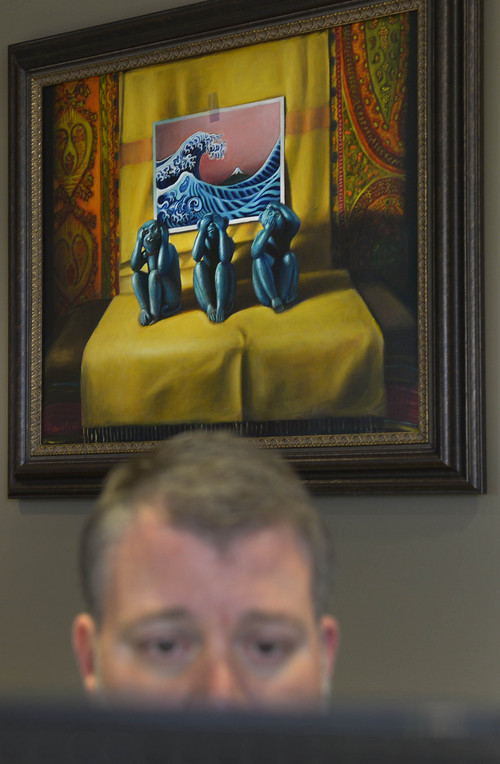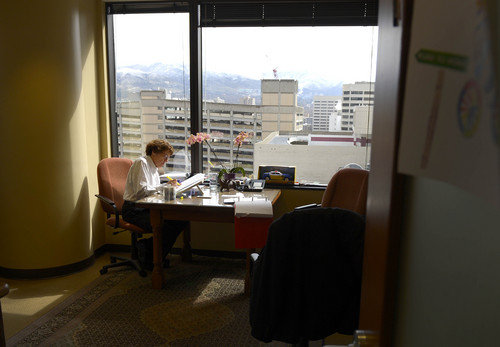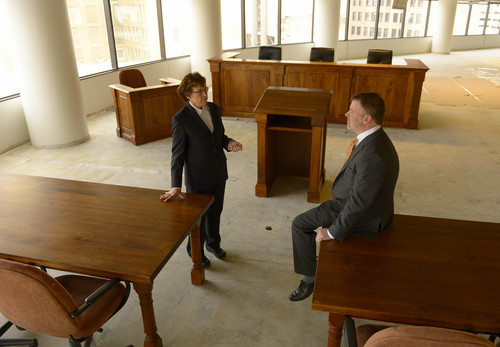This is an archived article that was published on sltrib.com in 2014, and information in the article may be outdated. It is provided only for personal research purposes and may not be reprinted.
When Mark Lawrence asked attorneys James E. Magleby and Peggy A. Tomsic to take on Utah and its ban on same-sex marriage, they had one question for him: Why us?
Lawrence, it turns out, had done his homework. He told the pair he was looking for lawyers with a winning track record of doing hard things "because this is going to be really difficult."
Magleby and Tomsic had squared off against armies of attorneys with endless resources in the face of long odds on behalf of underdogs before. A notable example is the $134 million verdict they won in 2012 for USA Power, a utility firm started by three people, against behemoth PacifiCorp.
But the fight Lawrence proposed seemed incredibly daunting.
This is, after all, Utah, among the most conservative states in the nation and home to a worldwide faith that has thrown sizable support into the defense of man/woman marriage laws. Besides, at that point, everyone envisioned a legal battle akin to California's Proposition 8, with two years of preparation, a monthlong trial before a judge, scads of witnesses and evidence, and full-on, bare-knuckle litigation.
The price tag, they figured, was at least $3 million — and more if the case went before the 10th U.S. Circuit Court of Appeals, as it will this week, and possibly the U.S. Supreme Court.
And, of course, Lawrence didn't have any money.
The two attorneys didn't flinch or tell Lawrence, as nearly everyone else had, that he was crazy. They kept listening.
Lawrence, an information technologist from West Valley City who founded the advocacy group Restore Our Humanity specifically to challenge Utah's marriage ban, was "really persuasive," Magleby said.
"Nobody I knew had ever heard of him," Tomsic said. "It was like, wow, he's a real grass-roots guy. He's coming from nowhere with a big heart and a big vision of how to change the world. It was awesome."
The attorneys realized the risks were substantial and numerous. They had experienced hatred and threats before — Magleby when he represented a former partner of La Caille restaurant — but what about their families, their children in particular? Would the case be a financial hardship for their Salt Lake City firm, Magleby & Greenwood? Would it hurt their ability to attract and retain clients?
"I didn't care," Tomsic said, "because this was the right thing to do, and I was willing not to get paid. I was willing to take whatever risks there were and work my heart out for this because it needs to happen, and if I can help do it, I'm there."
Still, there was one more consideration — a big one.
"We didn't just take this case without thinking long and hard about the merits of it," Magleby said. "We knew the worst thing that could happen for our clients or for the bigger picture [of marriage equality] was to take this case and get our a— kicked."
They devoured court records in other same-sex cases and concluded, as Magleby puts it, "Holy cow, this is a winner. It's not even close!"
"We didn't know at which level we would win," he added, "but we knew in the long run we were right."
Sure, the state might go after a big trial, with lots of witnesses and mountains of paperwork, the attorneys figured. But what they knew from PacifiCorp and other big wins is this: "We're as smart as anybody else and we know we'll work harder," Magleby said.
And with that, they were on board.
What they never anticipated is that the challenge to Amendment 3, overwhelmingly approved by Utah voters in 2004, would go as quickly and as efficiently as it did.
The attorneys filed the federal lawsuit March 25 on behalf of plaintiffs Derek Kitchen and Moudi Sbeity; Laurie Wood and Kody Partridge; and Kate Call and Karen Archer. On Dec. 4, U.S. District Judge Robert J. Shelby heard oral arguments.
"It was not a hard, intellectual legal argument," said Tomsic, whose opening statement has been described by some as historic. "It was getting across the point it's time, it's time now, and do it in this case."
Sixteen days later, pre-empting his own time frame by two weeks, Shelby granted summary judgment in favor of the plaintiffs.
Magleby was out of state when an email popped up on his iPad screen with two words: "We won!"
With dozens of cases pending, he thought, "Oh, good, we won something." Then emails were bing, bing, binging onto his screen one after another and Magleby realized it was the Kitchen v. Herbert case.
Tomsic was back at the office, hard at work on a new case, when an email also sprang up on one of the three monitors on her desk. The subject line said, in all capital letters, "YOU WON, YOU WON, YOU WON!" Scrolling down her inbox, she found the email with the court's order and quickly clicked to the last page of the 60-page decision "because you always want to know what the end is."
"It was the most amazing day I've ever felt in my life in my legal practice," Tomsic said. "Reading that decision and realizing that Judge Shelby had the courage and the integrity to follow the U.S. Constitution in a state where he knew it would be a very unpopular decision ... made me believe more in our system. It doesn't mean you always win, but if people do the best they can do to follow the law and follow the facts, you cannot ask for anything more than that."
Tomsic's next move: She texted her partner, Cindy Bateman, with whom she is rearing a son privately placed a decade ago when he was 3 years old, and asked, "Will you marry me?"
Magleby, 47, and Tomsic, 61, are graduates of the University of Utah's law school — Tomsic was editor of the Utah Law Review — and have worked together so long and so closely they banter like a married couple. Tomsic hired Magleby while a managing shareholder at Berman, Tomsic & Savage. Magleby hired Tomsic in 2009 after she closed her own firm.
They specialize in commercial litigation involving, as Magleby describes it, complicated problems "in fields we generally are not experts in, and we learn it, and we master it, and we win." For Magleby, that has meant learning about brine shrimp driers, polypropylene plants and how to build a chemical manufacturing facility. Tomsic has toured coal mines and power plants and learned how source code is programmed.
"That's the fun part for us," she said, "because you have to learn things you never thought you'd have to."
In the Amendment 3 case, Tomsic drew on firsthand expertise: her own life.
Tomsic grew up in Moab and came out — more accurately, was outed — when she was 21 years old. It was a dangerous time to identify as gay, given the discrimination and outright physical violence such revelations often triggered. Salt Lake City's former Sun Tavern and the lesbian bar Sisters were places "people felt safe" because of a shared "no-one-is-going-to-tell-on-you attitude."
Still, security offered escorts to cars to protect patrons from attacks. Customers often returned to their vehicles to find windows shattered.
"It was not unusual," Tomsic recalled, "for men to come in and call us 'sweat hogs,' bring boards and try to hit us."
Magleby, a straight man married almost 20 years with five children, said: "Marriage equality was not on the radar." People were just looking to not get beaten, he said. And when it happened, Tomsic chimed in, "nobody dared report it."
Fast-forward to Dec. 20, hours after Shelby rejected Utah's ban on same-sex marriage as unconstitutional.
"Going down to the county recorder's office and having bands playing and people singing and people crying and people cheering," Tomsic said. "That was extraordinary."
Added Magleby: "The great thing about being a lawyer is you can make a fundamental, life-changing difference in somebody's life that they can't get for themselves. The Kitchen case is just the pinnacle of that."
It's up to the 10th Circuit — and possibly the Supreme Court — to decide if that difference was fleeting or forever.
Career highlights for James Magleby and Peggy Tomsic include:
• Won $134 million verdict in USA Power v. PacifiCorp, et al, 21st-largest verdict in nation in 2012 (Tomsic and Magleby)
• Successfully defended Portland General in $1 billion claim in Bonneville Pacific bankruptcy (Tomsic)
• Achieved $4.7 million verdict in Haug v. La Caille, breach of partnership and fiduciary duty (Magleby)
• Reached $45 million settlement in ClearOne v. UBS, a securities dispute (Magleby)









